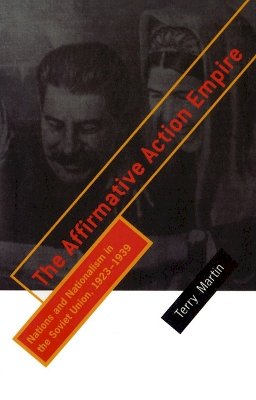12%OFF
Stock image for illustration purposes only - book cover, edition or condition may vary.
The Affirmative Action Empire: Nations and Nationalism in the Soviet Union, 1923-1939 (Wilder House Series in Politics, History, & Culture)
Terry Martin
FREE Delivery in Ireland
Description for The Affirmative Action Empire: Nations and Nationalism in the Soviet Union, 1923-1939 (Wilder House Series in Politics, History, & Culture)
Paperback. Series: The Wilder House Series in Politics, History & Culture. Num Pages: 528 pages, 51. BIC Classification: 1DVU; 3JJG; HBJD; HBLW; JFSL; JPFN; JPQB. Category: (P) Professional & Vocational; (UP) Postgraduate, Research & Scholarly; (UU) Undergraduate. Dimension: 232 x 156 x 32. Weight in Grams: 762. Nations and Nationalism in the Soviet Union, 1923-1939. Series: Wilder House Series in Politics, History & Culture. 528 pages, 47 tables, 4 maps. Cateogry: (P) Professional & Vocational; (UP) Postgraduate, Research & Scholarly; (UU) Undergraduate. BIC Classification: 1DVU; 3JJG; HBJD; HBLW; JFSL; JPFN; JPQB. Dimension: 232 x 156 x 32. Weight: 734.
The Soviet Union was the first of Europe's multiethnic states to confront the rising tide of nationalism by systematically promoting the national consciousness of its ethnic minorities and establishing for them many of the institutional forms characteristic of the modern nation-state. In the 1920s, the Bolshevik government, seeking to defuse nationalist sentiment, created tens of thousands of national territories. It trained new national leaders, established national languages, and financed the production of national-language cultural products.This was a massive and fascinating historical experiment in governing a multiethnic state. Terry Martin provides a comprehensive survey and interpretation, based on newly available archival ... Read moresources, of the Soviet management of the nationalities question. He traces the conflicts and tensions created by the geographic definition of national territories, the establishment of dozens of official national languages, and the world's first mass "affirmative action" programs. Martin examines the contradictions inherent in the Soviet nationality policy, which sought simultaneously to foster the growth of national consciousness among its minority populations while dictating the exact content of their cultures; to sponsor national liberation movements in neighboring countries, while eliminating all foreign influence on the Soviet Union's many diaspora nationalities. Martin explores the political logic of Stalin's policies as he responded to a perceived threat to Soviet unity in the 1930s by re-establishing the Russians as the state's leading nationality and deporting numerous "enemy nations."
Show Less
Product Details
Publisher
Cornell University Press
Series
The Wilder House Series in Politics, History & Culture
Place of Publication
Ithaca, United States
Shipping Time
Usually ships in 7 to 11 working days
About Terry Martin
Terry Martin is Associate Professor of History at Harvard University.
Reviews for The Affirmative Action Empire: Nations and Nationalism in the Soviet Union, 1923-1939 (Wilder House Series in Politics, History, & Culture)
Terry Martin's Affirmative Action Empire is an exceptional and unique book, indispensable for any student of ethnic politics in the Soviet Union and its successor states, notably the Russian Federation. It is unique both in its comprehensive, in-depth treatment of the evolution of the Soviet nationalities policy from its inception until the end of the 1930s and in its reliance ... Read moreon Soviet archival sources that have become accessible only recently.... A major contribution to the history of the Soviet Union and to the study of ethnicity.
Teresa Rakowska-Harmstone, Harvard University
Journal of Ukrainian Studies
The real virtue of Martin's book—and all of the best new Soviet scholarship—is not in the theoretical model it propounds, but in the power of its details, gleaned from previously unknown documents.... Martin is able, for the first time, to explain what it was that the Soviet Union's leaders actually intended their nationality policy to achieve.... Reading Martin's work,... one is struck, above all, by how much stranger the Soviet Union is beginning to seem, in retrospect, than we thought it was at the time, and how much more perverse.... Reading this history also gives us in the West an insight, however narrow, into the turmoil experienced in the non-Russian lands of the former Soviet Union during the last decade. Ukraine, Belarus, Uzbekistan, Georgia: these are now 'free' and independent states. Yet how real is this freedom? Might it not be another illusion, foisted upon them by a still powerful, and still much wealthier, Russian republic.
The New York Review of Books
Show Less

